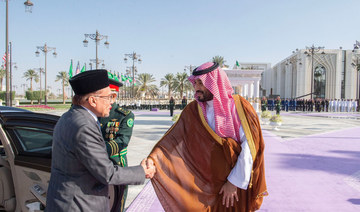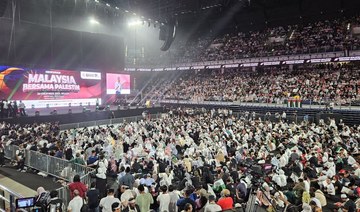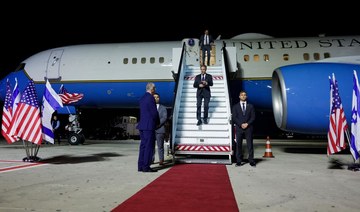ANKARA: President Tayyip Erdogan played up his plans to repatriate a million Syrian refugees as he rode a wave of nationalism to his third decade in power, but he could struggle to make good on the promise as conflict lingers on in neighboring Syria.
Erdogan, long seen as an ally by Syrian opponents of President Bashar Assad, emphasised refugee repatriation during bitter campaigning for Sunday’s run-off against Kemal Kilicidaroglu, who took an even tougher stance on the issue.
The focus on refugee return ahead of the election caused alarm among the 3.4 million Syrians living in Turkiye, where resentment toward them is growing.
Many of the refugees came from parts of Syria that remain under Assad’s control and say they can never return to their towns and villages while he remains in power.
Under Erdogan’s plans, they would not have to. With Qatari help, he says Turkiye has been building new housing in rebel-held northwest Syria — a region where Ankara has troops on the ground whose presence has deterred Syrian government attacks.
The plans imply a redoubling of Turkiye’s commitment to the rebel-held area where it has been building influence for years, even as Assad demands a timetable for the withdrawal of Turkish troops as a condition for progress toward rebuilding ties.
With Turkish voters increasingly resentful of the refugees — Turkiye hosts more than any other country – Erdogan’s plans put the issue at the heart of his Syria policy, alongside concerns about Syrian Kurdish groups that have carved out enclaves at the border and are deemed a national security threat by Turkiye.
Erdogan has said he aims to ensure the return of one million refugees within a year to the opposition-held areas. His interior minister, Suleyman Soylu, last week attended the inauguration of a housing project meant to accommodate returning Syrians in the Syrian town of Jarablus.
“It is our duty to fulfil our citizens’expectations about this issue through ways and means that befit our country,” Erdogan said in his victory speech on Sunday, adding that nearly 600,000 Syrians had already returned voluntarily to safe areas.
But for many Syrians in Turkiye, the prospect is unappealing.
“I would like to go back to Syria but not to Jarablus ... I would like to go back home, to Latakia,” said a Syrian who gave his name as Ahmed, a 28-year-old student at Ankara University, referring to a government-held region on the Mediterranean.
“I would like to go back, but if Assad stays, I can’t due to security concerns.”
Controlled by an array of armed groups, much of the northwest also suffers from lawlessness.
“Conditions in northern Syria remain so bad and unstable that large-scale return will be difficult to arrange, despite all these reports about Turkiye and Qatar building housing and infrastructure,” said Aron Lund, a Syria expert with Century International, a think tank.
“It seems like a drop in the ocean and the overall economic situation keeps deteriorating.”
Driven partly by its goal of securing refugee returns, Turkiye has changed diplomatic course on Syria, following other regional governments by reopening channels to Assad, who Erdogan once called a “butcher”.
But the rapprochement is moving more slowly than the thaw between Assad and his former Arab foes, reflecting Turkiye’s much deeper role in a country where Russia, Iran and the United States also have forces on the ground.
Analysts think Ankara will not agree easily to Assad’s demand for a withdrawal timetable, noting that any sign of Turkish forces leaving would prompt more Syrians to try to flee for Turkiye, fearing a return of Assad’s rule to the northwest.
“Turkiye is highly unlikely to compromise on troop withdrawal, which likely means hundreds of thousands of refugees heading their way if and when they leave Idlib,” said Dareen Khalifa of International Crisis Group, a think-tank.
Many Syrians in Turkiye were relieved at Kilicidaroglu’s defeat. During his campaign, he said he would discuss plans for refugee returns with Assad after reinstating relations, and that returns would be completed in two years but would not be forced.
He sharpened his tone after trailing Erdogan in the first round, vowing to send all migrants back to their countries.
Ibrahim Kalin, Erdogan’s chief foreign policy adviser, said on Monday that Turkiye wanted a safe, dignified and voluntary return.
International refugee law stipulates that all returns must be voluntary.
“We’re making plans to secure the return of one or 1.5 million Syrians in the first place,” Kalin told a local broadcaster.
Samir Alabdullah of the Harmoon Center for Contemporary Studies in Istanbul, a non-profit research institution, said he did not expect much to change now the election battle is over.
“Syrians are relieved after Erdogan’s victory ... There is nothing wrong with voluntary return. We do not expect policy change on migration,” he said.
Turkiye’s Erdogan faces struggle to meet Syrian refugee promise
https://arab.news/9ecse
Turkiye’s Erdogan faces struggle to meet Syrian refugee promise
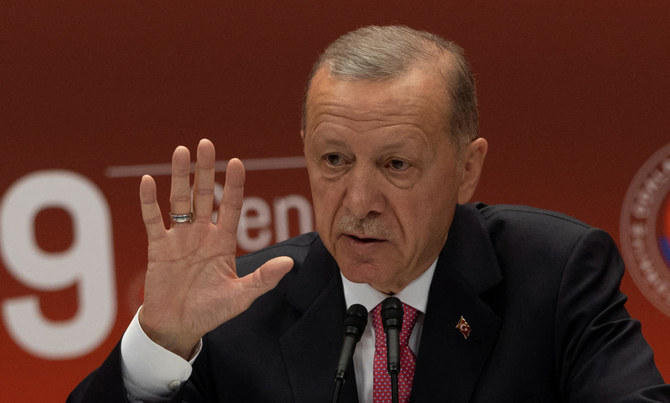
- Turkiye hosts 3.4 million Syrian refugees
- Erdogan wants to send a million back as resentment grows
Houthis claim Red Sea victory against US Navy

- Militia forces lack technical or military capability to achieve their objectives in the Mediterranean, analyst says
AL-MUKALLA: The Houthis have reiterated a warning of strikes against ships bound for or with links to Israel — including those in the Mediterranean — as they claimed victory against the US Navy in the Red Sea.
The Houthi-controlled SABA news agency reported that the fourth phase of the militia’s pro-Palestine campaign would involve targeting all ships en route to Israel that came within range of their drones and missiles, noting that the US, UK, and other Western navies “stood helpless” in the face of their attacks.
“The fourth phase demonstrates the striking strength of the Yemeni armed forces in battling the world’s most potent naval weaponry, the American, British and European fleets, as well as the Zionist (Israel) navy,” SABA said.
Houthi military spokesman Yahya Sarea said on Friday strikes against Israel-linked ships would be expanded to the Mediterranean. Attacks would be escalated to include any companies interacting with Israel if the country carried out its planned attack on the Palestinian Rafah.
Since November, the Houthis have launched hundreds of ballistic missiles and drones at commercial and navy vessels in the Red Sea, Bab Al-Mandab Strait and the Gulf of Aden. They claim attacks are only aimed at ships linked with Israel in a bid to force an end to its siege on the Gaza Strip.
They have also fired at US and UK commercial and navy ships in international waters off Yemen after the two countries launched strikes against Houthi-controlled areas.
On Saturday, Houthi information minister Dhaif Allah Al-Shami claimed the US was forced to withdraw its aircraft carrier and other naval ships from the Red Sea after failing to counteract attacks. He added new offensives would begin against Israeli ships in the Mediterranean in the coming days.
“They failed badly. Yemeni missiles and drones beat the US Navy, and its military, cruisers, destroyers and aircraft carriers started to retreat from our seas,” Al-Shami said in an interview with Lebanon’s Al-Mayadeen TV news channel.
Yemen specialists have disputed Houthi assertions that they have military weapons capable of reaching Israeli ships in the Mediterranean.
Brig. Gen. Mohammed Al-Kumaim, a Yemeni military analyst, told Arab News on Sunday the Houthis would only be able to carry out such attacks if they had advanced weaponry. He said the Houthis were expanding their campaign against ships to avoid growing public resentment in areas under their control after the militia had failed to pay public employees and repair services.
Al-Kumaim added the Houthis might claim responsibility for an attack on a ship in the Mediterranean which was carried out by an Iran-backed group operating in the region.
“Theoretically and technologically, the Houthis lack any technical or military capability to achieve their objectives (in the Mediterranean),” Al-Kumaim said.
Jordanian-Iraqi economic forum begins at Dead Sea resort

- A specialized session will focus on investment prospects in various economic sectors
AMMAN: Jordanian Minister of Investment Kholoud Saqqaf opened the Economic Forum for Financial, Industrial, and Commercial Partnerships between Iraq and Jordan on Sunday.
The forum, which is organized jointly by the Iraqi Business Council in collaboration with the Jordan and Amman chambers of industry, aims to strengthen economic ties between the two countries.
Held at the King Hussein Convention Center on the shores of the Dead Sea, the forum is the largest regional gathering for fostering economic cooperation between Jordan and Iraq, Jordan News Agency reported.
Over two days, the event will promote regional integration by facilitating economic connectivity and encourage collaboration across sectors.
Discussions will cover investment opportunities in Jordan and Iraq, prospects for commercial and industrial ventures, economic modernization initiatives, and opportunities in Jordan’s free and development zones.
Key figures attending include Kamel Dulaimi, the Iraq president’s chief of staff, ministers from Jordan and Iraq, as well as business leaders, investors and representatives from Arab and foreign companies.
Discussions are expected to focus on the banking sector’s role in providing financial support, while highlighting success stories from investment companies in both countries.
A specialized session will focus on investment prospects in various economic sectors, with a particular emphasis on mining and industry.
At the opening, Saqqaf highlighted investment prospects displayed on the Invest in Jordan platform, which align with the kingdom’s Economic Modernization Vision.
Meanwhile, Iraqi Minister of Industry and Mineral Resources Khaled Battal Al-Najm drew attention to his country’s industrial strategy and plans for a joint economic zone with Jordan, alongside efforts to address unemployment and attract foreign investment, especially in mining.
Dulaimi emphasized the significance of Iraqi President Abdul Latif Rashid’s recent visit to Jordan, underscoring discussions aimed at strengthening ties and enhancing economic systems to facilitate investment projects.
UAE delivers 400 tonnes of food aid to Gaza
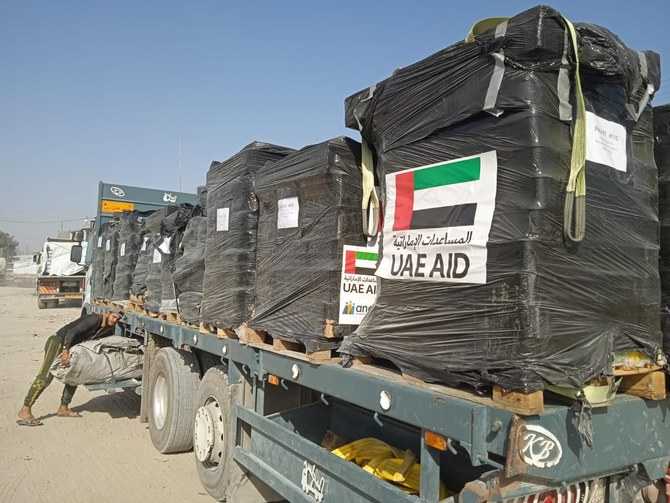
- Delivery, specifically for the northern areas of the enclave, is enough to feed about 120,000 people
DUBAI: The UAE, in partnership with American Near East Refugee Aid, announced on Sunday that it had delivered 400 tonnes of food aid to Gaza.
The delivery, specifically for the northern areas of the enclave, is enough to feed about 120,000 people, Emirates News Agency reported.
Reem Al-Hashimy, Emirati minister of state for international cooperation, said: “The UAE’s safe and successful delivery and distribution of food relief to the Gaza Strip, especially the northern Gaza Strip, marks a significant scaling up in action.”
She continued: “We remain firmly committed to our position of solidarity with the brotherly Palestinian people and alleviating suffering in the Gaza Strip. The UAE, working in parallel with international partners, is determined more than ever to intensify all efforts to ensure that aid lifelines get to those who need it the most.”
Sean Carroll, CEO of ANERA, thanked the Emirati government for its assistance in getting the much-needed aid to the Palestinian people.
“ANERA and the people we serve are extremely grateful for support from the government and people of the UAE, that allows us to deliver this food to northern Gaza, where the needs are so great,” he said.
Last month the UAE allocated $15 million under Cyprus’s Amalthea Fund to bolster aid efforts in Gaza.
Meanwhile, the Gulf country continues to collaborate with international partners and organizations to enable the effective delivery of food and relief via land, air and sea.
To date, the UAE has dispatched more than 31,000 tonnes of humanitarian supplies, including food, relief items and medical supplies, using 256 flights, 46 airdrops, 1,231 trucks, and six ships.
The UAE has embarked on several sustainable relief projects to ensure a consistent supply of food and water to the people of Gaza.
These initiatives include the establishment of five automatic bakeries, the provision of flour to eight existing bakeries, and the installation of six desalination plants with a combined capacity of 1.2 million gallons of water a day.
Malaysian PM condemns West’s ‘sheer hypocrisy’ over Gaza war

- Anwar Ibrahim spoke on a wide range of topics in interview during recent visit to Riyadh
- He pointed out Malaysia had “issued statements to demand that the Gaza genocide must end”
DUBAI: Malaysia takes a strong stance on the war in Gaza and condemns the “sheer hypocrisy” of Western countries over the ongoing Israeli killing of Palestinian women and children, Prime Minister Anwar Ibrahim has said.
Speaking to Katie Jensen, host of the Arab News current affairs program “Frankly Speaking,” during a visit to Riyadh for a special meeting of the World Economic Forum last week, he said that a failure to prevent genocide in Gaza could foster extremism.
“We have issued statements to suggest that their genocide must end,” Anwar said in an interview that can be read in full on page 3.
“And it’s sheer hypocrisy for countries, some countries in the West, including the United States, to deny these continued killings of children and women and civilians.
“Whatever your political position is, I don’t believe that in this period we can condone these sort of inhuman, barbaric acts against fellow human beings. And I think that position is clear. Our position is very strong in that direction.
“I know for an emerging, developing country, it may sound a bit too harsh, but then how do you condone continued killings of women and children? There’s no other way except to at least express in the very strongest terms possible.
“I appreciate the role of the Arab neighbors and Turkiye and Iran and all these other countries trying to do their part. And I think we in Malaysia and many other countries outside the region, too, are expressing gross concern because people are feeling enraged.
“And we don’t want this to prolong, because it will only lead to groups to foster fanatical extremist or terrorist action in the absence of the failure of the international community.”
According to recent reports, the prosecutor of the International Criminal Court may soon issue warrants for the arrest of Israeli Prime Minister Benjamin Netanyahu and Defense Minister Yoav Gallant on charges of deliberately starving Palestinians in Gaza.
If the ICC rules that genocide is taking place in Gaza, Anwar said he would support calls for the arrest of the Israeli ministers.
“I don’t believe that any reasonable person could dispute the incontrovertible effects adduced to support their allegation that genocide has been committed,” he said. “Once it is established that genocide happened, then of course the warrants have to be issued.”

In Kuala Lumpur, a trial is currently taking place after an Israeli national was arrested on March 28 suspected of entering Malaysia to assassinate a compatriot. He was found in possession of six guns and some 200 rounds of ammunition.
The case has raised speculation as to whether the man, named by local authorities as Shalom Avitan, was in fact a spy.
Asked whether any proof had been found connecting the Israeli national to espionage or organized crime, Anwar said investigations were ongoing.
“They have not established the fact that whether this criminal is a spy, but certainly the actions, the movements, the amount of weapons and the link networking within the country is of course concerning,” he said.
“And the authorities are taking tough measures to make sure they get to the bottom of it.”
On whether an independent Palestinian state is likely to come to fruition this year from the ashes of the Gaza war, Anwar said no country — including the US — has the right to deny the resounding global support for Palestinian statehood.
“There are 139 countries that have given recognition to the state of Palestine,” he said. “Now, why must one or two countries consider them above all these considerations and refuse to accept this?
“And to my mind, it is dishonorable to deny the right, not only of Palestinians but of the international community when they decide after years or decades of deliberations, looking at the facts, looking at historical decisions, looking at the precarious position now on the issue of security of the region, issue of economic progress.
“After all these considerations, 139 say, yes, we must recognize the existence of the state of Palestine. I don’t believe any country has the right to deny the sentiments, aspirations of the world.”
Netanyahu says ending Gaza war now would keep Hamas in power
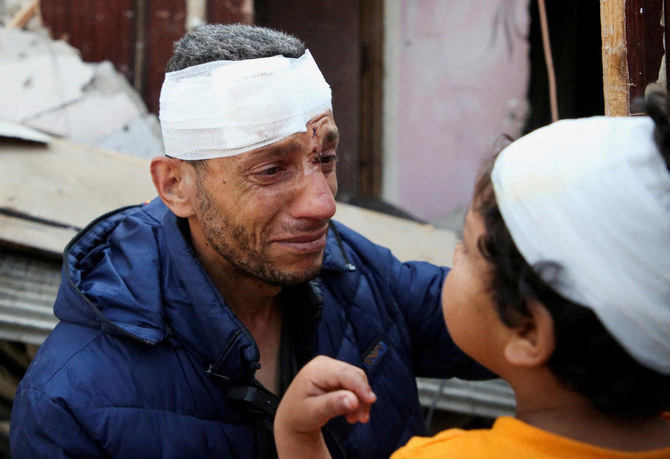
- Israeli leader hardens his rejection of Hamas demands for an end to the Gaza war in exchange for the freeing of hostages
JERUSALEM: Prime Minister Benjamin Netanyahu hardened his rejection of Hamas demands for an end to the Gaza war in exchange for the freeing of hostages, saying on Sunday that would keep the Palestinian Islamist group in power and pose a threat to Israel.
Netanyahu said Israel was willing to pause fighting in Gaza in order to secure the release of hostages still being held by Hamas, believed to number more than 130.
“But while Israel has shown willingness, Hamas remains entrenched in its extreme positions, first among them the demand to remove all our forces from the Gaza Strip, end the war, and leave Hamas in power,” Netanyahu said.
“Israel cannot accept that.”
“Hamas would be able to achieve its promise of carrying out again and again and again its massacres, rapes and kidnapping.”
In Cairo, Hamas leaders held a second day of truce talks with Egyptian and Qatari mediators, with no apparent progress reported as the group maintained its demand that any agreement must end the war in Gaza, Palestinian officials said.
The war began after an assault by Hamas on southern Israel on Oct. 7 in which 1,200 people were killed and 252 hostages taken, according to Israeli tallies.
Israel’s ensuring military offensive has killed more than 34,600 Palestinians, according to the health ministry in the Hamas-ruled Gaza. The bombardment has devastated much of the coastal enclave and caused a humanitarian crisis.











